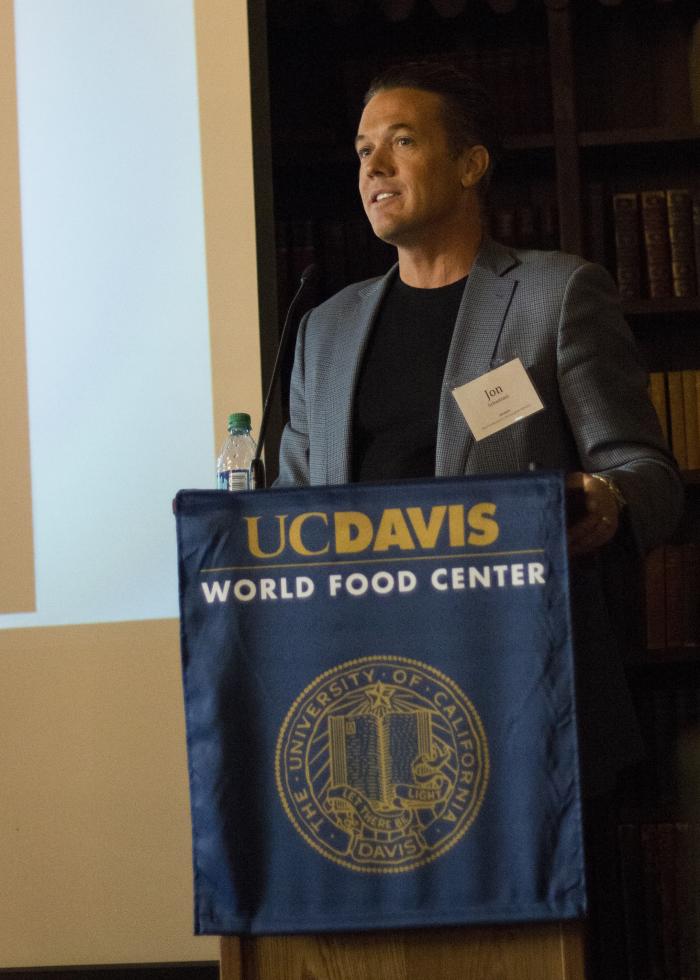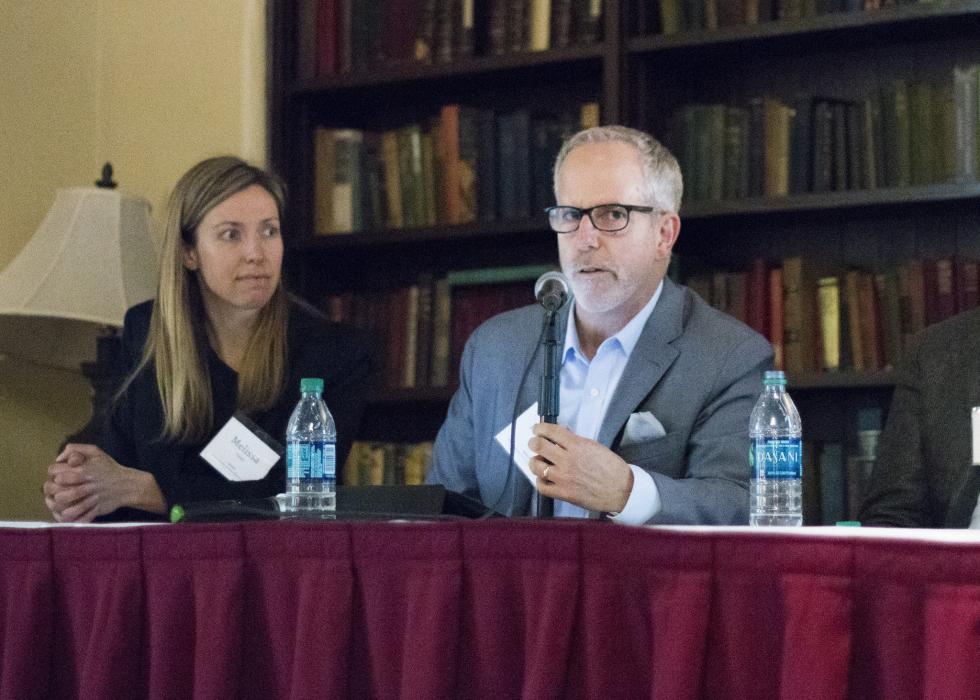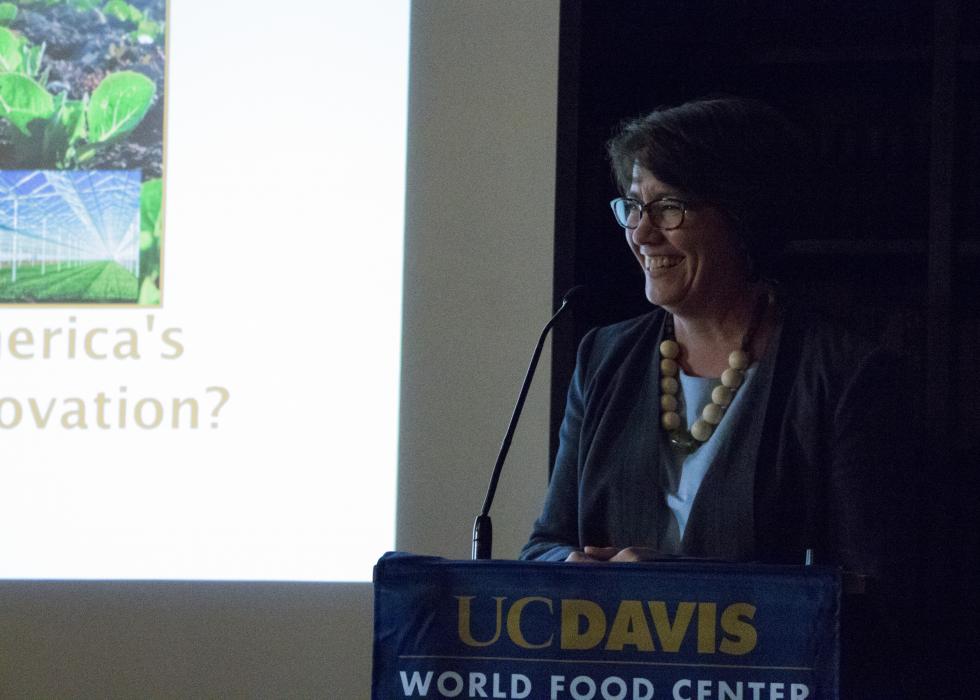The Sacramento region prides itself as the Farm-to-Fork capital, and the UC Davis World Food Center is looking to bolster that reputation by developing a thriving economic hub for innovation in food and agricultural technology.
The center hosted “Who’s Driving America’s Food and Agtech Innovation?” in May, an inaugural gathering with some of the major players in the region’s food industry. “We wanted to bring focus and attention to the food and agtech innovation that’s happening in the region. There are interesting activities going on in Sacramento,” says Julie Morris, director of technology innovation at the World Food Center, founded in 2013 to develop the status of UC Davis as a leader in food and agriculture, and identify ways to improve food systems.
Jon Sebastiani, founder of food incubator Sonoma Brands, gives
his keynote speech during a panel hosted by the UC Davis World
Food Center. (Photo courtesy Brad Hooker/UC Davis)

The event explored how the Capital Region might cash in on the booming food and agtech industry. “There’s a lot of enthusiasm for encouraging and growing [food and agtech] as a key sector of the economy,” Morris says. Internationally, the industry saw $4.6 billion in investments last year — up from half that in 2014 and $200 million in 2012 — with $2.4 billion of that in the U.S. alone, according to AgFunder, which researches investment trends and whose co-founder, Melissa Tilney, was a keynote speaker at the event.
The other keynote, Jon Sebastiani, creator of healthful snack Krave Jerky and founder of food incubator Sonoma Brands, discussed growing brands in an era of rapidly changing buying practices ($4 billion of spending shifted from packaged foods to fresh and organic foods in 2014) and the new focus on supporting authentic brands with natural ingredients and ethical practices.
The “who’s-who” of the local food scene was in attendance, including Pam Marrone of Davis-based Marrone Bio Innovations, Diane Parro, the chief innovation officer for the City of Davis, and Golden 1 Center executive chef Michael Tuohy, who participated in a panel at the event. Tuohy, along with visiting panelists from the Bay Area, fielded questions on startups strategies, investment opportunities and food waste.
AgFunder Co-Founder Melissa Tilney and Golden 1 Center Executive
Chef Michael Tuohy participate in a panel hosted by the World
Food Center. (Photo courtesy Brad Hooker/UC Davis)

Focus on the University
UC Davis needs to become the spot to sow the seeds of the region’s future in food and agtech innovation, according to panelists at the May event. And the World Food Center is already on it. The center has been working with AgStart (a product of the defunct Sacramento Regional Technology Alliance), now based out of Woodland, which helps grow food and agtech businesses. Other programming includes the annual Ag Innovation Entrepreneurship Academy, established within the UCD Graduate School of Management, which focuses on translating ag research and ideas into economically-viable products and draws international attendees.
In addition to nurturing start-ups forming within the university, Morris says the World Food Center brings together outside companies with research and talent inside the UC’s labs through the development of consortia around food and agriculture topics to solve specific problems (a recent consortium on precision irrigation had 30 participants). “That’s the model that will be useful going forward — to take issues and try to work them through with people on the inside of the university, as well as the outside stakeholders who are interested in working on a bigger solution rather than just their one piece they bring to the table,” she says.
Attracting the Right Crowd
Ejnar Knudsen, CEO of agribusiness investment firm AGR Partners announced at the event that his company is relocating to Davis from Visalia. AGR Partners is a late-stage investor; investments have included Almark Foods, which provides hard-boiled eggs to retailers and restaurants, and an international dairy and livestock equipment company.
Josette Lewis, associate director of the UC Davis World Food
Center, presents during a special event in May.(Photo courtesy
Brad Hooker/UC Davis)

The firm relocated for proximity to UC Davis — and the new location will maintain the company’s agricultural roots. For Knudsen, the region is an untapped resource. “The region is not well understood. [Among] folks I talk with about Davis and Sacramento, most don’t know where it is, they don’t realize how close the airport is, they don’t realize how strong the talent pool is,” Knudsen says. “I expect [food and agtech investment] will grow for the same reasons that AGR Partners moved to the region. It has a lot going for it.”
If the vibrancy of the World Food Center’s May event is any indicator, Knudsen’s prediction may be true.
Morris agrees: “It’s clear to me people see a future for the region.”



